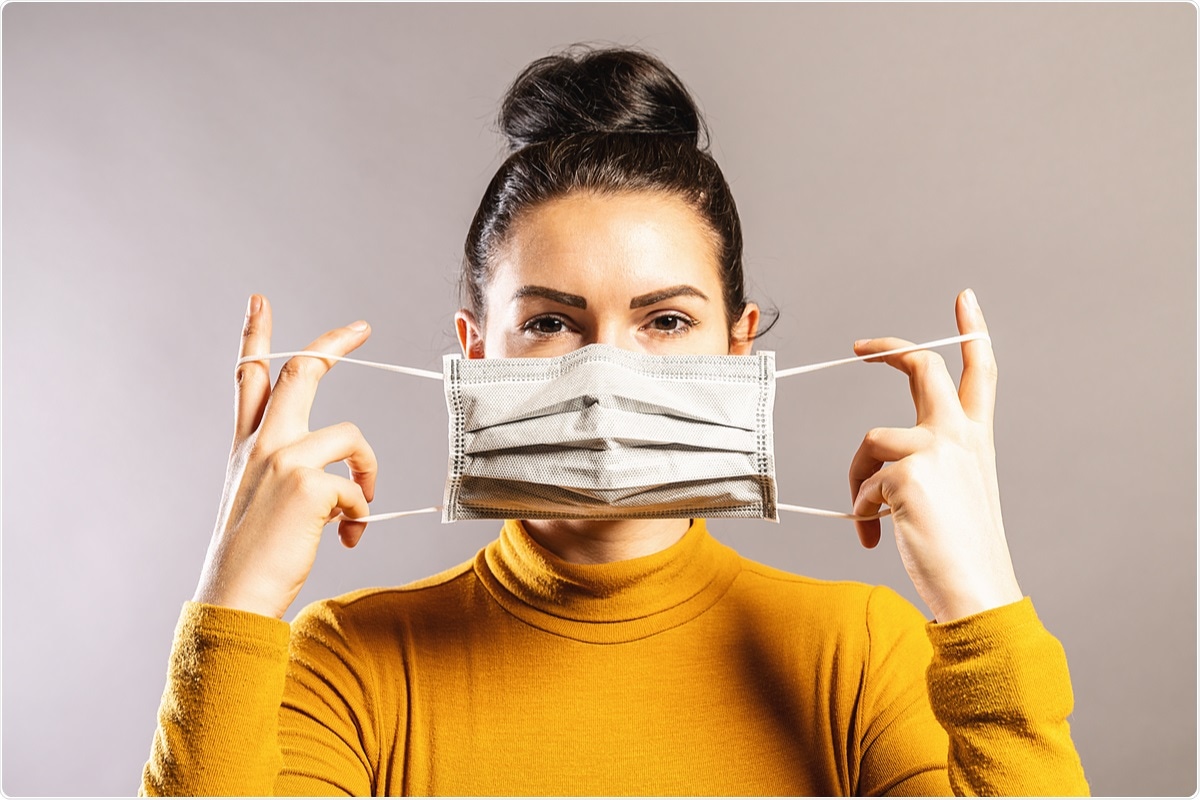Since the emergence of the coronavirus disease 2019 (COVID-19), caused by the severe acute respiratory syndrome coronavirus 2 (SARS-CoV-2), universal masking has been implemented in many countries.
Wearing face masks or coverings can help reduce the risk of being infected with SARS-CoV-2, as they prevent infectious respiratory droplets' entry. At the same time, it prevents droplets from reaching people when the infected sneeze, cough, talk, or breathe.
A team of researchers at the University of Edinburgh, UK, found that wearing face-covering promotes mental health. Those who wore face coverings or masks most of the time had better mental health and well-being than those who did not.

The study, published on the pre-print medRxiv* server, surveyed more than 11,000 participants across the UK.
Face covering
The World Health Organization (WHO) recommends wearing a face mask as part of a comprehensive strategy of mitigating the transmission of SARS-CoV-2. The use of a mask alone is not sufficient to provide adequate protection, but it is effective along with other infection control measures.
The health agency also recommends that people wear a mask if they are around other people. When wearing the mask properly, it should cover the nose, mouth, and chin.
Meanwhile, the U.S. Centers for Disease Control and Prevention (CDC) urge the public to wear face coverings made with cloth. Surgical and medical masks are intended for healthcare workers. This is to avoid depleting the supply of this medical equipment, which is crucial in protecting frontline workers.
The study
The team conducted longitudinal analyses in the UK. To arrive at the study findings, they recruited the participants who completed the CovidLife surveys. The data was collected via the Qualtrics platform between April and June 2020. The mental health outcomes of the participants were evaluated.
The researchers revealed that adherence to face-covering guidelines had no association with poorer mental health. The team found that people who always wore their masks had better mental health than those who did not.
Hence, the study shows that wearing face coverings or masks more often will not negatively impact mental health.
The study findings unveiled that the odds of feeling anxious were 58% lower among those who always wore their masks. The likelihood of experiencing depressive symptoms was 25% lower among people who wore their masks most of the time. Lastly, the odds of feeling lonely were 67% lower among those who always wore their masks.
"Indeed, the opposite appears to be the case: stronger adherence to guidelines is associated with less anxiety and loneliness, and higher life satisfaction and wellbeing," the researchers wrote in the paper.
The study findings consensuses with past studies that found that not adhering to the rule of wearing face masks can be viewed negatively by others. It reveals the other side to adherence behavior, even though stigmatization or discomfort of wearing masks do or do not harm mental health and well-being.
However, the team emphasized that wearing face masks alone is insufficient in preventing infection with SARS-Cov-2. Adhering to infection control measures such as washing the hands regularly, maintaining social distance, and avoiding crowded places are crucial factors that should be applied alongside face coverings.
"Our data provide strong evidence that following government guidance on face coverings is associated with better rather than poorer mental health and wellbeing," the team concluded.
"This evidence could be an important motivator for continued advocacy by policymakers and adherence by members of the public," they added.
*Important Notice
medRxiv publishes preliminary scientific reports that are not peer-reviewed and, therefore, should not be regarded as conclusive, guide clinical practice/health-related behavior, or treated as established information.
- Altschul, D., Ritchie, C., Kwong, A., Hartley, L., Nangle, C., Edwards, R. et al. (2020). Face covering adherence is positively associated with better mental health and wellbeing: a longitudinal analysis of the CovidLife surveys. medRxiv. doi: https://doi.org/10.1101/2020.12.18.20248477, https://www.medrxiv.org/content/10.1101/2020.12.18.20248477v1
https://news.google.com/__i/rss/rd/articles/CBMihAFodHRwczovL3d3dy5uZXdzLW1lZGljYWwubmV0L25ld3MvMjAyMDEyMjQvUmVzZWFyY2hlcnMtZmluZC1jb3JyZWxhdGlvbi1iZXR3ZWVuLWNvbnNpc3RlbnQtbWFzay13ZWFyaW5nLWFuZC1pbXByb3ZlZC13ZWxsLWJlaW5nLmFzcHjSAYgBaHR0cHM6Ly93d3cubmV3cy1tZWRpY2FsLm5ldC9hbXAvbmV3cy8yMDIwMTIyNC9SZXNlYXJjaGVycy1maW5kLWNvcnJlbGF0aW9uLWJldHdlZW4tY29uc2lzdGVudC1tYXNrLXdlYXJpbmctYW5kLWltcHJvdmVkLXdlbGwtYmVpbmcuYXNweA?oc=5
2020-12-24 12:22:00Z
CAIiEBWw6nsCadFJILU2bMh0l30qMwgEKioIACIQZdRflS9INK7zM5FkBi3R3CoUCAoiEGXUX5UvSDSu8zORZAYt0dwww8TIBg
Bagikan Berita Ini














0 Response to "Researchers find correlation between consistent mask-wearing and improved well-being - News-Medical.Net"
Post a Comment